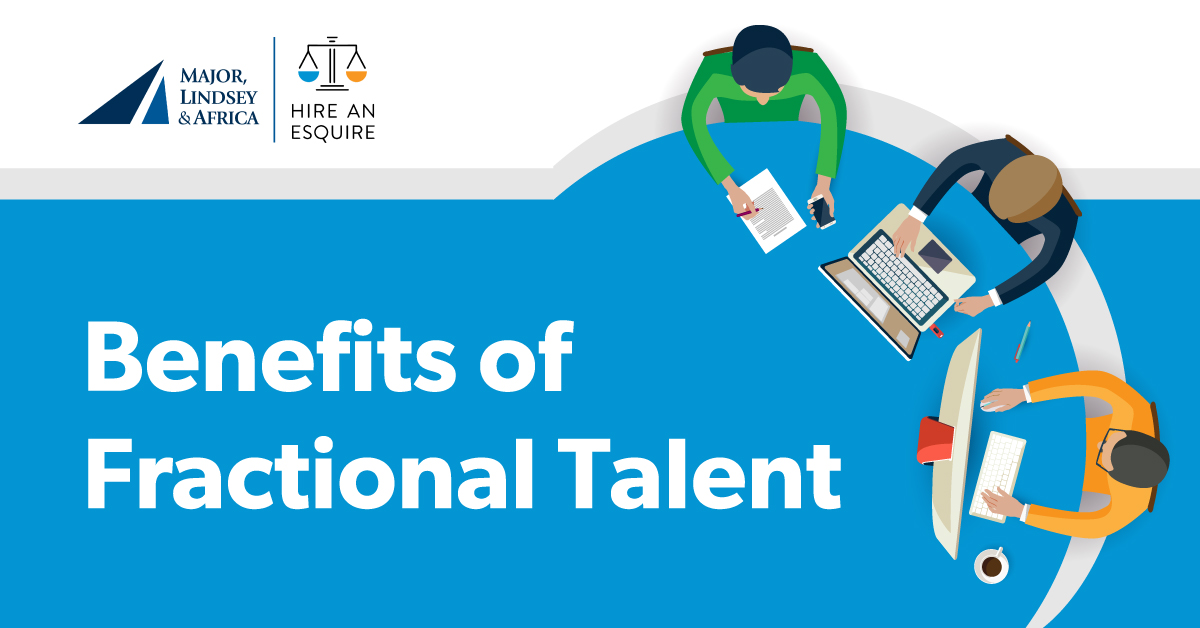The Benefits of Using Fractional Talent
June 18, 2024
Successfully Right-Size Your:
In-House Legal Team with Fractional Legal Talent
Here are a few ways organizations can work with fractional legal professionals to ease workloads and save money.
Scenario #1: Overflow Work
- Client: A state credit union with a small legal department and small budget.
- Pain Point: The credit union regularly had more work than their small in-house department could handle, but the overflow work was not consistent enough to justify a full-time or a part-time hire who expected consistent hours.
- How MLA’s Hire an Esquire Helped: The credit union found and hired 2 attorneys with expertise in banking and finance for load leveling. They engaged the same attorneys for several years, whose weekly billings ranged from 0–25 hours.
Scenario #2: Niche Expertise
- Client: A medical device company
- Pain Point: The company’s legal department needed a niche expertise in healthcare and data privacy. The project scope didn’t justify a full-time or part-time contract hire who expected set hours.
- How MLA’s Hire an Esquire Helped: The company found an attorney with this unique expertise who could work for a few hours a week on a specific project; the legal department has re-engaged the attorney as-needed for related work.
Scenario #3: Reducing Outside Counsel Costs
- Client: A mid-market cybersecurity company
- Pain Point: The company's team of core attorneys was stretched too thin during busy times. They feared they couldn’t complete the necessary work and worried about attrition from their current team burning out during peak times. They had no budget for additional hires. Their law firm’s high billable rates for overflow work broke their budget, and the work was often delegated to junior associates and had to be redone by the GC.
- How MLA’s Hire an Esquire Helped: An experienced attorney was found who could handle all manners of overflow work. The legal department worked with 2 different attorneys with time commitments ranging from 0–20 hours/week for 2+ years.
Law Firm with Fractional Legal Talent
Here are a few ways law firms can work with fractional legal professionals to ease workloads and save money.
Scenario #1: Competing for—and Completing—RFPs
- Client: A mid-sized, multi-practice law firm that frequently engaged in RFP processes
- Pain Point: The scope of potential RFPs didn’t warrant full-time, long-term hires. When they won RFPs, the firm needed varying types and numbers of attorneys.
- How MLA’s Hire an Esquire Helped: The firm found attorneys with the skill sets and availability to meet the RFP requirements and won more business. They have hired attorneys who could work 0–15 hours/week and 3-month to 2-year timeframes.
Scenario #2: Flexibility and Scalability
- Client: A mid-size law firm that worked with primarily mid-market companies
- Pain Point: To win clients, they needed to maintain competitive rates. To remain profitable, the firm needed to closely match talent costs to variable workloads.
- How MLA’s Hire an Esquire Helped: The firm built a “bench” of fractional attorneys to handle regular overflow work from commercial contract review to compliance work, allowing the firm to keep a lean core team of full-time attorneys.
Scenario #3: Access to Specialized Talent
- Client: A 15-attorney law firm that primarily engaged in corporate and transactional work
- Pain Point: Occasionally, their clients needed niche expertise that wasn’t available within their small firm.
- How MLA’s Hire an Esquire Helped: The firm found the right seasoned attorney for a variety of 5–50-hour projects ranging from executive compensation to international dispute law, partnership tax law, and many other highly niche areas.